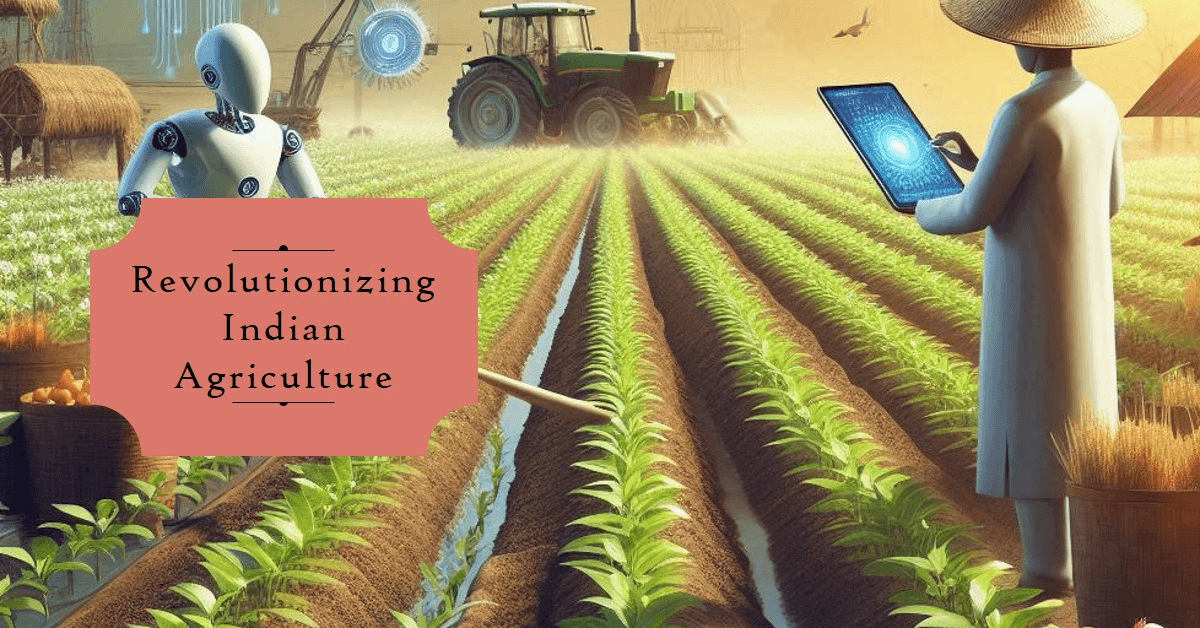Agriculture has always been the backbone of India’s economy, employing nearly half of the country’s workforce and contributing significantly to its GDP. However, traditional farming practices face numerous challenges, including unpredictable weather patterns, inefficient use of resources, and fragmented supply chains. To address these issues, the integration of Artificial Intelligence (AI) and data analytics is revolutionizing Indian agriculture, offering farmers innovative solutions that enhance productivity, efficiency, and sustainability. From precision farming to supply chain optimization, AI is transforming the agricultural landscape and paving the way for a tech-driven future in farming.
The Role of AI in Agriculture
AI technologies, including machine learning, computer vision, and big data analytics, are being increasingly adopted in agriculture to tackle various challenges. These technologies enable farmers to make data-driven decisions, optimize resource usage, and increase crop yields. Some of the key applications of AI in Indian agriculture include:
- Precision Farming: Precision farming uses AI-driven tools to provide real-time insights into soil health, crop conditions, and weather forecasts. By analyzing vast amounts of data from sensors, drones, and satellite imagery, AI helps farmers make informed decisions about irrigation, fertilization, and pest control. For example, AI-based platforms like Fasal and SatSure offer predictive analytics that guide farmers on the best times to plant, water, and harvest crops, thereby maximizing yield and minimizing waste.
- Smart Irrigation Systems: Water scarcity is a critical issue in Indian agriculture, and traditional irrigation methods often lead to water wastage. AI-powered smart irrigation systems use data from soil moisture sensors and weather forecasts to optimize water usage, ensuring that crops receive the right amount of water at the right time. Companies like AgSmartic Technologies are developing AI-based solutions that help farmers reduce water consumption by up to 50%, contributing to more sustainable farming practices.
- Pest and Disease Detection: AI-driven image recognition technologies can identify pests and diseases in crops at an early stage, enabling farmers to take preventive measures before infestations spread. For instance, the Plantix app uses AI to analyze images of crops and diagnose diseases, offering treatment recommendations to farmers. This proactive approach reduces the reliance on harmful pesticides and promotes healthier crop growth.
- Supply Chain Optimization: Beyond the farm, AI is playing a crucial role in streamlining agricultural supply chains. By analyzing data on crop yields, market demand, and pricing trends, AI helps farmers and distributors optimize their logistics and reduce post-harvest losses. Startups like Ninjacart are using AI to connect farmers directly with retailers, eliminating middlemen and ensuring fair prices for both producers and consumers.
The Impact on Farmers

The integration of AI in agriculture is not just about enhancing productivity; it’s also about empowering farmers. By providing access to real-time data and insights, AI is helping farmers make better decisions, reduce costs, and increase their income. For smallholder farmers, who make up the majority of India’s agricultural sector, these technologies can be life-changing. AI-powered platforms like Gramophone and DeHaat offer personalized farming advice, market information, and access to quality inputs, leveling the playing field for farmers in remote areas.
Moreover, AI is contributing to sustainable agriculture by promoting the efficient use of resources and reducing the environmental impact of farming. Precision farming techniques minimize the overuse of fertilizers and pesticides, while smart irrigation systems conserve water—a critical resource in a country where agriculture accounts for nearly 90% of total water usage.
Challenges and the Way Forward

While the potential of AI in Indian agriculture is immense, there are several challenges that need to be addressed. The adoption of AI technologies requires significant investment in infrastructure, including internet connectivity, data storage, and access to smart devices. For many farmers, especially those in rural areas, these resources are still out of reach.
Additionally, there is a need for greater awareness and training on the use of AI tools. Many farmers lack the technical knowledge to fully leverage these technologies, which can hinder their adoption. Government support, along with public-private partnerships, will be crucial in scaling AI solutions and making them accessible to all farmers.
Furthermore, ethical considerations such as data privacy and ownership must be addressed to build trust among farmers. Clear regulations and guidelines on data usage will be essential to ensure that AI technologies are used responsibly and for the benefit of the agricultural community.
Conclusion
AI is poised to transform Indian agriculture, offering solutions to some of the sector’s most pressing challenges. By enabling precision farming, optimizing resource use, and enhancing supply chain efficiency, AI has the potential to boost productivity, reduce costs, and improve the livelihoods of farmers. However, to fully realize the benefits of AI, it is essential to address the challenges of accessibility, awareness, and data privacy. With the right support and collaboration, AI can drive a new era of sustainable and profitable agriculture in India.
For more insights on how technology is reshaping industries, visit Epic Infinite where we explore the intersection of innovation and sustainability. Discover more about the latest trends in AI, data analytics, and their impact on various sectors, including agriculture.










